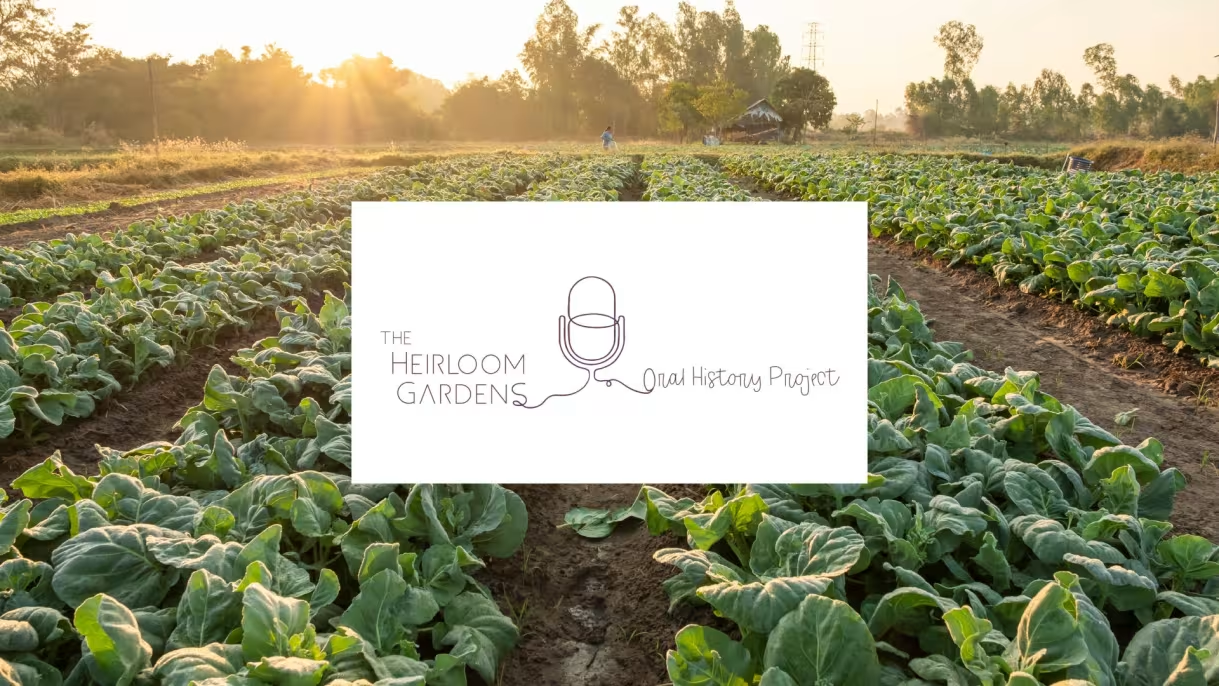

Princeton SPIA’s Tessa Desmond Spearheads Effort to Preserve Agricultural Wisdom for Future Generations
Project aims to preserve farming practices of Black and Indigenous people in danger of disappearing
One day last fall in North Carolina, Tessa Lowinske Desmond, a research specialist at the Princeton School of Public and International Affairs, stood silently alongside a man named Levi Grisset Sr. She held recording equipment and cast a microphone in Grisset’s direction. He was sharing memories of growing collard greens and other heirloom vegetables over the course of many decades on land originally farmed by his grandfather.
“For one reason or another, the only thing I ever planted was heirloom,” Grisset said. “I call it 'original stuff,' ’cause I knew heirloom seeds is valuable, I know that, and that's what I've been planting my entire life.”
Grisset’s stories are part of an inaugural batch of 72 audio recordings collected by the Heirloom Gardens Oral History Project, a collaboration among Princeton, Spelman College, and the Ujamaa Cooperative Farming Alliance (UCFA). Since the project began last year, students and faculty have been interviewing farmers, gardeners, chefs, and others who are keeping alive the culinary and agricultural practices and traditions of Black and Indigenous people in Appalachia and the Southeastern United States.
The oral histories are valuable because of the cultural and practical knowledge they contain. Participants share their life histories alongside agricultural wisdom accumulated over time, from how to select seeds to save for planting next year to recipes for southern staples like pepper vinegar, a key ingredient (for some) in barbecue. It only takes one break in the chain for that knowledge to be lost, and once it’s gone, it’s gone forever.
“I think for most of the students who come to work on this project, they recognize that this knowledge of seeds, foods, and relationship with the land is very powerful, even if it’s knowledge that has been systematically demeaned over time,” Lowinske Desmond said.
The project, funded by a grant from the Princeton Alliance for Collaborative Research and Innovation, is about midway through its two-part pilot phase. This growing season, project leaders expect that eight new full-time undergraduate interns from Princeton and Spelman, who will work for two months across four locations, will record as many as 100 more oral histories. “We’re taking everything we’ve learned in our first year of work and putting it into practice,” said Lowinske Desmond, the project’s co-principal investigator (along with Assistant Professor of Anthropology Hanna Garth of Princeton and Professor of Biochemistry Kimberly Jackson of Spelman) and a founding member of UCFA.
Based in Maryland, UCFA was formed in 2020 to provide more opportunities and support for growers from historically oppressed and marginalized communities. A Swahili word and the fourth principle of Kwanzaa, Ujaama means “cooperative economics.”
“I was inspired by the work that Ujamaa was doing,” said Lowinske Desmond, “and the whole time I’m in meetings with them, these incredible stories about Black and Indigenous farmers that kept coming up and people in the organization felt like they were important to document.”
Lowinske Desmond’s research interests revolve around food and farming. In addition to her work with the Heirloom Gardens Oral History Project, she founded and directs The Seed Farm at Princeton, where rare and culturally meaningful seed crops are grown, and co-leads the Princeton Food Project, a collective of interdisciplinary scholars whose work addresses food cultures and systems. She set aside an idea for a book project after hearing Ujamaa’s urgent desire to capture these stories and memories.
There is a deep urgency to getting these stories recorded, but we also have to make this knowledge relevant across a huge geographic and generational spread,” Lowinske Desmond said. “We don’t want this project to be just pressing the record button. We want to build the infrastructure so these stories can reach people where they need to be reached.”
While Princeton and Spelman have contributed many resources to support the project, UCFA has given it broad vision and deep networks. People like UCFA co-founders Bonnetta Adeeb and Fatimah Hasan have helped connect faculty and students to the communities where these stories live. “Every site has a mentor from UCFA who works with the interns on the ground to build relationships,” Lowinske Desmond said. “These are populations where building trust is very important, and we’ve been able to build these high-quality relationships.”
The most frequently mentioned plant in Heirloom Gardens Oral History Project’s archives to date is collard greens, a leafy vegetable rich in nutrients and history. Enslaved African Americans in the South embraced the crop as a staple in their gardens. Heirloom collards, grown from seeds handed down through generations, contain a robust genetic diversity hard to recognize in today’s standard supermarket variety. With varying textures, tastes, sizes, and colors, the kaleidoscopic variety of heirloom collards represent what could be lost if special attention is not paid to preserving their seeds and the stories that surround them.
Now that the initial work of getting the project off the ground is completed, its leaders are looking ahead to making their recordings widely available so they can reach groups and individuals across the country.

